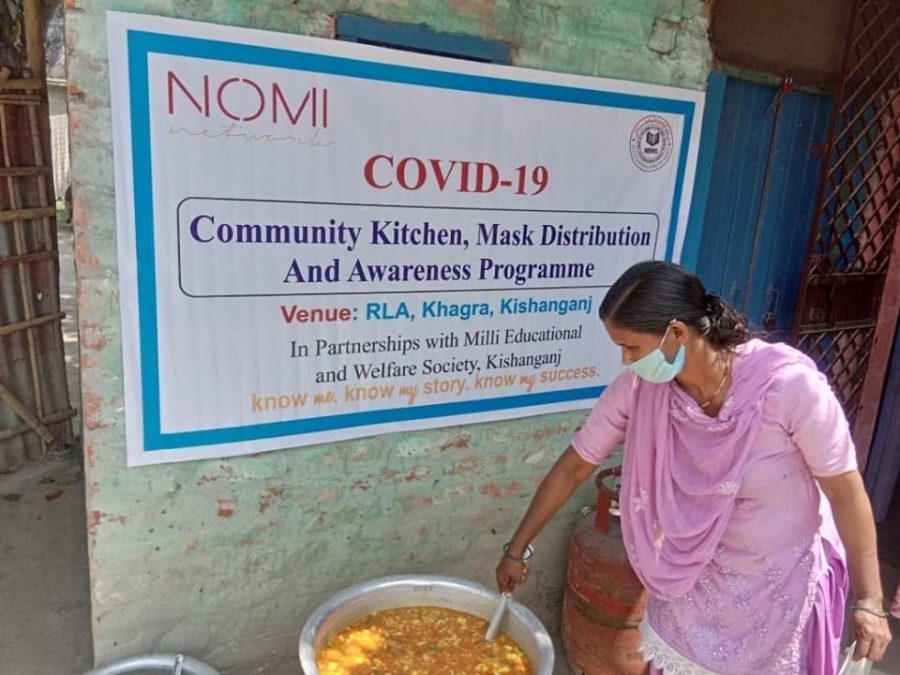The Silent Sufferers of the Coronavirus Pandemic: Human-Trafficking Victims
COURTESY OF NOMI NETWORK
The anti-human trafficking nonprofit Nomi Network is working in India to provide resources to those most affected by the coronavirus.
April 22, 2020
The tentacles of the coronavirus pandemic have infiltrated the darkest of all places in the world — human trafficking. One disastrous side effect of social distancing is the danger of millions of people falling victim to human trafficking in the coming months in developing countries
According to the National Human Trafficking Hotline, human trafficking is a form of modern-day slavery in which traffickers use force, fraud or coercion to control victims for the purpose of engaging in commercial sex acts or labor services against their will. This includes forced labor, marriage, prostitution and organ removal.
Estimates assume there are 40.3 million victims worldwide, which makes one in every 200 people a modern-day slave. Of that number, 10 million are presumably children. The sad truth is that since 2003, only 225,000 victims have been detected, with an alarmingly low number of prosecutions and even fewer convictions; for example, there were only 9,071 convictions in 2016. It is a multibillion-dollar industry, bringing in around $150 billion a year for the traffickers.
The lockdowns around the world have a brutal impact on the human-trafficking world as sex-trafficking victims are struggling to care for their basic needs, numbers of cybersex-trafficked children are rising and human-trafficking rescue missions are stopped. Furthermore, the lingering pain of hunger endangers even more people to fall into the arms of traffickers.
Sex-trafficking victims struggle to care for their basic needs
The highest number of people in modern slavery is in India. In rural areas, 75% of the population, which equals 133.5 million people, live on $0.43, or 33 rupees, per day. While the Indian government has pledged $23 billion for food and cash for its poorest citizens, it remains questionable how the millions of unbanked will have access to the stimulus.
As an advisory board member for the anti-human trafficking non-governmental organization Nomi Network, I witness the deepened horrors this pandemic evokes through the eyes of our local staff. The Nomi Networks on the ground in India are working in the poorest states of Bihar, West Bengal and Odisha. In our last Zoom meeting update, they painted a picture of the current pandemic’s implication for sex-trafficking victims, so dreadful that it is difficult to grasp.
The shock waves of the novel coronavirus do not stop at the doorsteps of brothels. As the red-light districts have been shut down, sex workers are robbed of their work. For their traffickers, they now have zero value. Consequently, their tormentors do not provide for their basic needs like food, water and hygiene products on a regular basis anymore. However, sex workers in red-light districts are undocumented sex-trafficking victims who do not have government-issued IDs. Therefore, they do not qualify to obtain a permission ID allowing them to partake in food and water government aid programs — if and when they make it into the rural areas.
When hunger and thirst force them outside, they face brutal police violence. Additionally, due to the wrongful channeling of frustrations, robbery and domestic violence are skyrocketing. Since there is only limited law enforcement at night, rape and murder in red-light districts are intensifying as the industry shifts even more below the radar.
Together with the local government, Nomi Network was able to obtain four permission ID cards at each of their nine centers, allowing them to participate in government aid programs and provide for their communities. Additionally, a community kitchen was initiated along with widespread training programs to prevent misinformation and teach hygiene in accordance with WHO guidelines. In the coming days, the women of Nomi Network will have sewn 15,000 masks to be distributed among the villages.
Danger of falling victim to human-trafficking
However, it is not only the abundant sex-trafficking victims that suffer from hunger due to the lockdowns. In developing countries, the fear of starvation is spreading even faster than the virus itself.
The hunger-induced sword of Damocles hanging over the heads of the poorest incites the most vulnerable to fall right into the clutches of traffickers. Gruesomely, the coronavirus pandemic will act as a catalyst that will reverse the trend of reduced poverty and erase nearly all the valuable progress of the last five years.
The World Bank estimates that as a direct consequence of the novel coronavirus, nearly half a billion people could be pushed below the poverty line, highlighting the magnitude of this economic shock. Those in extreme poverty, or those living on less than $1.90 a day, could rise from 40 million to 60 million people; the number of people living on less than $3.20 a day from 40 million to 150 million; and those living on less than $5.50 a day from 70 million to 180 million. These numbers portray potential prey for traffickers. With no other hope on the horizon, poverty can force the affected to turn to the last resort, in a desperate attempt to stave off their thirst and hunger.
Rising numbers of children cybersex exploitation
With schools closing, the U.S. FBI has issued a warning of the rising risk of children across Southeast Asia to be targeted by cybersex traffickers. The Philippines, an epicenter for livestream sex abuse trade; Thailand; and Cambodia report an increase in online sex abuse.
Human-trafficking rescue operations put on halt
Globally imposed travel restrictions have forcefully brought human-trafficking survivor rescue missions to a freeze. Consequently, sex-trafficking victims are forced to quarantine with their tormentors. Rescue organizations that save Cambodian and Vietnamese “brides” in China are left with only the possibility to advise the victims on places to hide if they have not already lost contact after the virus outbreak struck. Brazil’s government has stopped all anti-slavery operations until further notice. Rescued Bengali sex-trafficking survivors are stranded as the Indian government halts trains and bus services to Bangladesh. These fragments of fates stand exemplary for the millions of shadows.
At the end stands the question of how tall the pile of broken glass will be after the pandemic has passed. Will the earth stand in solidarity and protect the most vulnerable?
Once you fall into the devil’s clutches, the chances of ever getting out again alive are small. Hidden in dark corners behind shadows, far from the visible eye of the masses, these realities cause silent tears to drop.











